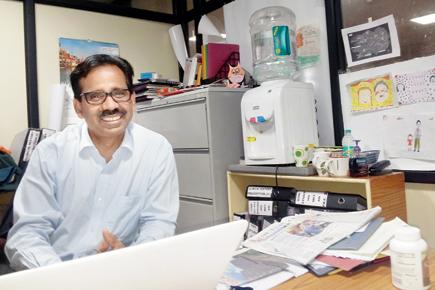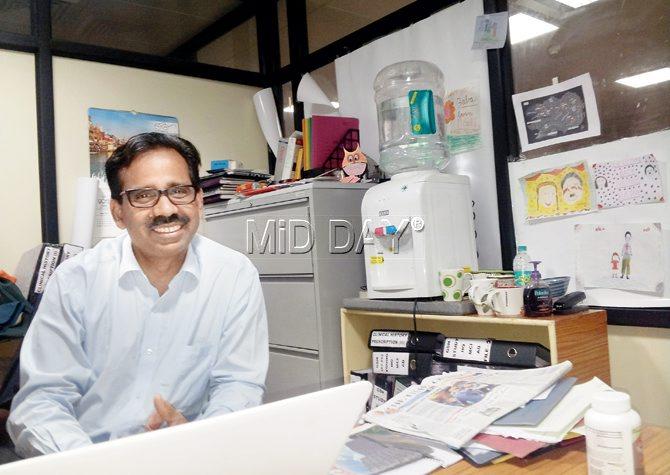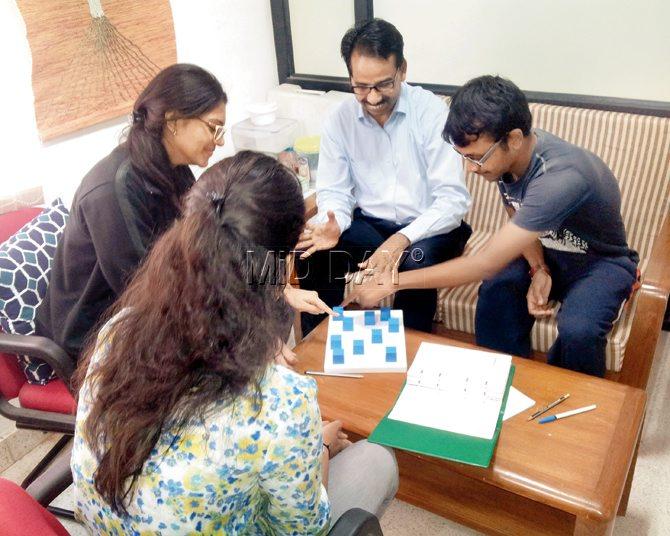What cracking the Alzheimer’s code before anyone else in the world means to a Delhi scientist who kept at it for 10 years

Dr Pravat Mandal
Close to the Delhi-Jaipur highway that’s perennially clogged with speeding sedans and belching lorries, a frail Indian scientist has found the possible answer to arresting the Alzheimer’s Disease.

Dr Pravat Mandal worked with a team of 20 for the last 10 years at the National Brain Research Center before he achieved the breakthrough surrounding glutathione this April. Pics/ Shantanu Guha Ray
ADVERTISEMENT
Dr Pravat Mandal works a little over 16 hours every day in a laboratory with his team of 20 at the National Brain Research Center near Manesar, in an attempt to stay away from using drugs to halt brain degeneration in mice — a standard practice followed by scientists across the world. Instead, he is figuring a unique alternative that involves measuring what he calls “coolant in your brain”.

Mandal and his team unwind over a board game
Alzhiemer’s, a degenerative brain disorder that affects 15 crore Indians, is a ticking time bomb. By 2030, Indian numbers are expected to double. Overlooking early symptoms that include short-term memory loss and increased confusion, allows it to progress rapidly, making the job of neuroscientists tougher. An early diagnostic test would be a game changer.
Mandal thinks he has the answer. He speaks of glutathione, an anti-oxidant whose dippinglevels indicate the onset
of the condition and its predecessor, Mild Cognitive Impairment (MCI).
Measuring its levels in certain sections of the brain means he can keep a tab on its rise and fall. A dip in the chemical in the hippocampus and the frontal cortex regions could indicate the onset of the disease, Mandal explains, through tests he has conducted on both, Alzheimer’s and MCI patients and those with a fit brain. When the brain functions normally, glutathione absorbs radicals that are usually generated, preventing damage to brain cells. But when its levels dip, radicals have a field day. Once low levels are identified, with a change in diet and lifestyle, it’s possible for a patient to gradually up
brain immunity.
An adjunct associate professor of radiology at the John Hopkins University currently on loan to the NBRC, Mandal calls his achievement — considered path breaking by the global neuroscience community — as a new method that will “improve the GPS system of the brain”. “It’s [Alzheimer’s] more than just about forgetting things. It takes over your brain. You lose the ability to swallow, talk, clean yourself. My treatment is about combatting this challenge,” he explains.
Mandal cracked the code in April this year, two months before the world celebrated Alzheimer's Awareness Month. The disease is the sixth leading cause of death in the US, and worldwide, there are a little over 75 million patients.
His approach is considered remarkable (medical journal Biological Psychiatry hailed it as a wonder), marking a clear shift from previous failed attempts that targeted deposits of misshapen, sticky proteins that are known as plaques, also the hallmark of the Alzheimer’s patient’s brain. That he chose humans for his tests, not animals, raises the possibilities of early diagnosis and developing drugs to treat. Clinical trials of medicines could begin within the next few years, he thinks. “We’ve seen a series of drug failures in the past, but we must also remember that active work on Alzheimer’s started in Western laboratories only in 1987.”
His discovery becomes even more relevant when he offers startling figures. Across the world, a majority of Alzheimer's patients are 65 or older. It is the most expensive disease in the world, costing the globe more than heart disease and cancer. On an average, it would take about R50,00 a month to support an Alzheimer’s patient. In the US, a new patient joins the deadly club every 67 seconds, according to American non-profit, The Alzheimer’s Association.
In India, doctors are crippled by lack of awareness. “When people start ageing, we take certain changes for granted. No one really talks about it. It’s not widely known that children too have a 50 per cent chance of carrying the erroneous gene. Testing them at 18 is prudent, but who is offering Indians advice? Where are our trained counselors in the numbers that we need to win this battle?”
Throwing a look at a painting made by his 14-year-old daughter that reads, “Come home quickly Daddy”, the soft-spoken scientist knows the value of patience and resolve. “I don’t make excuses for myself, because I know as well as anybody that I can't find the magical pill overnight. But I have achieved the first step.”
Timing has played an interesting role in his research career. In the same month when he achieved the breakthrough, an Indian-American filmmaker named Rakesh Kumar preparing to screen his debut film, After Ever After in the San Francisco Bay Area. Starring Ravi Bhatnagar and Robert Ernst, it told the story of a widower struggling with alcoholism, trying to explain the concept of ‘happily ever after’ to his nine-year-old daughter who is an Alzheimer’s patient.
If she were for real, Mandal would have liked to meet her. “And treat her. The breakthrough was my happiest moment because I realised I could ensure a new life for those who had given up. Knowing they have another shot at life would mean everything.”
 Subscribe today by clicking the link and stay updated with the latest news!" Click here!
Subscribe today by clicking the link and stay updated with the latest news!" Click here!







